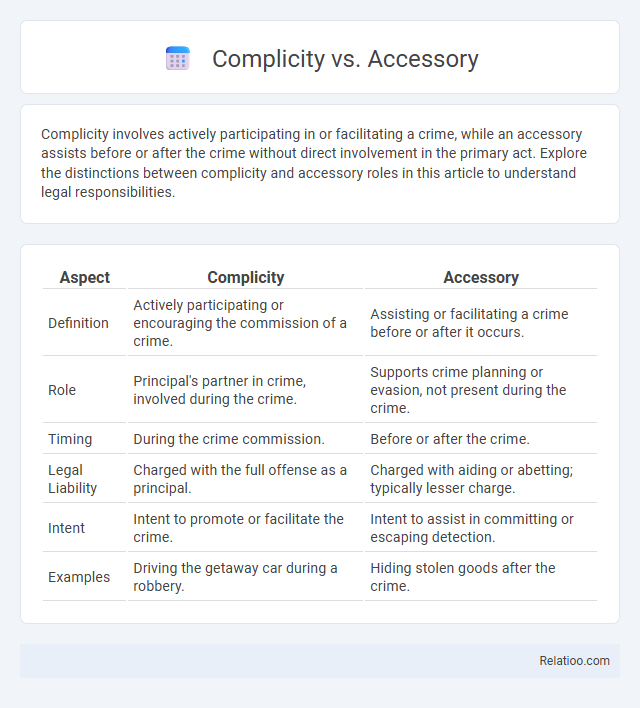Complicity involves actively participating in or facilitating a crime, while an accessory assists before or after the crime without direct involvement in the primary act. Explore the distinctions between complicity and accessory roles in this article to understand legal responsibilities.
Table of Comparison
| Aspect | Complicity | Accessory |
|---|---|---|
| Definition | Actively participating or encouraging the commission of a crime. | Assisting or facilitating a crime before or after it occurs. |
| Role | Principal's partner in crime, involved during the crime. | Supports crime planning or evasion, not present during the crime. |
| Timing | During the crime commission. | Before or after the crime. |
| Legal Liability | Charged with the full offense as a principal. | Charged with aiding or abetting; typically lesser charge. |
| Intent | Intent to promote or facilitate the crime. | Intent to assist in committing or escaping detection. |
| Examples | Driving the getaway car during a robbery. | Hiding stolen goods after the crime. |
Understanding Legal Terminology: Complicity vs Accessory
Understanding the distinctions between complicity and accessory is crucial in criminal law, as complicity refers to assisting or encouraging the commission of a crime, while an accessory specifically involves aiding or abetting before or after the crime occurs. Complicity encompasses a broader range of involvement, including both principal and secondary participants, whereas accessory typically distinguishes between accessory before the fact and accessory after the fact. Accurate interpretation of these terms affects legal responsibility, sentencing, and the application of criminal statutes.
Definition of Complicity in Criminal Law
Complicity in criminal law refers to the involvement of a person who intentionally aids, abets, or encourages the commission of a crime, making them legally responsible alongside the principal offender. Unlike an accessory who assists before or after the crime, complicity requires active participation or encouragement during the crime's commission. Understanding your role in complicity is crucial, as it carries similar penalties to those faced by the primary wrongdoer.
Defining an Accessory in Legal Context
An accessory in the legal context is defined as a person who assists or facilitates the commission of a crime without directly engaging in the criminal act. Unlike principals who carry out the crime, accessories contribute before or after the offense, such as by providing aid, shelter, or information. Your awareness of the distinctions between an accessory and complicity is crucial for understanding how liability is assigned based on involvement in a criminal act.
Key Differences between Complicity and Accessory
Complicity involves intentionally helping or encouraging the commission of a crime, while an accessory specifically refers to a person who assists before (accessory before the fact) or after (accessory after the fact) the crime without directly participating in the criminal act. The key difference lies in the timing and level of involvement: complicity requires active participation or encouragement during the crime, whereas accessories play a supportive role either before or after the crime occurs. Legal definitions may vary, but complicity generally implies a closer connection to the primary criminal act than accessory liability.
Legal Responsibilities of a Complice
A complice, or accomplice, shares direct legal responsibility for a crime by intentionally aiding or encouraging the principal offender before or during the offense. Unlike an accessory who may assist after the crime, a complice's liability is equal to that of the main perpetrator, making them subject to the same criminal charges and penalties. Courts typically evaluate the level of intent and active participation when determining the complice's culpability and legal consequences.
Legal Consequences for Accessories
Legal consequences for accessories vary based on their level of involvement in a crime, typically resulting in charges that reflect aiding or facilitating the principal offense. Accessories before the fact, who assist in planning or encouraging the crime, often face similar penalties to the primary offender, including imprisonment and fines. In contrast, accessories after the fact, who aid the offender post-crime, usually receive lesser sentences but can still be prosecuted for obstruction of justice or hindering prosecution.
Degrees of Involvement: Primary vs Secondary Actors
Degrees of involvement distinguish primary actors, who directly commit the criminal act, from secondary actors, such as accessories or those complicit, who facilitate or encourage the offense. Your understanding of complicity involves recognizing individuals who aid, abet, or promote the crime without executing the primary act, whereas accessories may assist before or after the crime, impacting legal responsibility differently. Clear differentiation among these roles is essential for accurately assessing criminal liability and applying appropriate legal consequences.
Real-Life Examples: Complicity and Accessory Cases
Complicity involves intentionally helping or encouraging a crime, while an accessory typically aids after the crime has been committed, either before or after the fact. Real-life cases illustrate complicity when someone plans a robbery alongside the perpetrator, whereas accessory examples include harboring a fugitive after the offense. Understanding these distinctions helps you assess legal responsibilities and potential liabilities in criminal acts.
Defenses against Charges of Complicity or Accessory
Defenses against charges of complicity or accessory often hinge on proving lack of intent or knowledge regarding the principal crime. Your strongest defense may involve demonstrating that you neither aided, abetted, nor encouraged the criminal act, negating the essential elements of complicity or accessory. Challenging the prosecution's evidence on your involvement or intent can significantly impact the outcome of such criminal charges.
Importance of Intent in Determining Complicity or Accessory
Intent plays a crucial role in distinguishing complicity from being an accessory in criminal law, as it defines your level of involvement and culpability. Complicity requires a shared intent to commit the crime, meaning you must have knowingly and intentionally assisted or encouraged the principal offender. In contrast, an accessory may be involved before or after the crime but without the same degree of intent to facilitate the criminal act, impacting legal consequences significantly.

Infographic: Complicity vs Accessory
 relatioo.com
relatioo.com